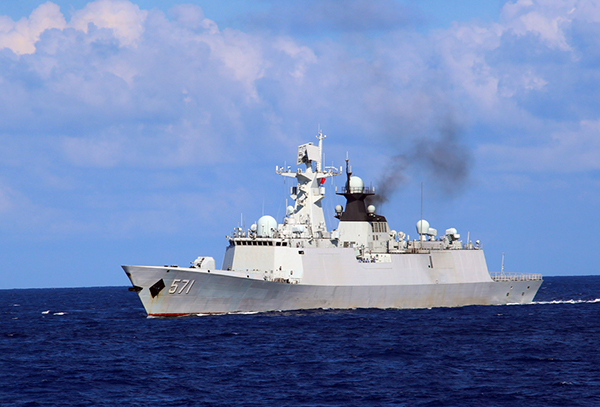Will the Philippines now walk the talk?
Updated: 2016-07-16 09:03
(China Daily)
|
|||||||||
 |
|
Missile destroyer Guangzhou launches an air-defense missile during a military exercise in the water area near south China's Hainan Island and Xisha islands, July 8, 2016. Chinese navy conducted an annual combat drill in the water area near south China's Hainan Island and Xisha islands on Friday. [Photo/Xinhua] |
"Let those who tied the bell on the tiger be the ones to untie it," goes a Chinese proverb, which means trouble is best solved by those who create it. Whatever the Philippine government was thinking when it decided to put its disputes with China in the South China Sea before a kangaroo court, it was surely not that the process would bring peace and harmony to a tranquil tropical sea.
China has been reiterating it will not accept the arbitral tribunal's opinion and would stick to the principle of settling disputes through direct negotiation. That policy is rock solid.
As neighbors facing each other across the sea, China and the Philippines have been friends for generations. There were no territorial disputes between them until the 1970s, when the Philippines suddenly decided that some of China's islands and reefs were up for grabs and occupied them without so much as a "by your leave". China's reaction to this affront has been restrained, to say the least, as it is not too difficult to conclude that China is the encroached-upon party rather than the encroacher.
In 2013, the government of former Philippine president Benigno Aquino III ignored previous agreements with China and went running to the Permanent Court of Arbitration. Aquino has since passed into history, and the job of cleaning up his mess has fallen upon the new Philippine President Rodrigo Duterte, who seems willing to talk directly with China.
Even after the absurd arbitration ruling, China retains its faith in a peaceful solution and will welcome direct negotiation. A statement issued by the Chinese leadership on Tuesday said China is still ready to resolve disputes peacefully through negotiation and consultation with those states directly concerned. And it will make every effort to seek win-win results and maintain peace, which is so vital to the stability and prosperity of the region.
Bringing the issue back to the negotiation table and finding a long-term solution is in the interests of all parties, and it is now up to the Philippines to show the willingness to carry it out. Duterte has begun to make positive gestures, but is his country ready to walk the talk?
China has said the door to talks is always open, but it will not welcome any unreasonable demands nor sit idle if deliberately provoked.
China will now decide whether to set up an air defense identification zone over the South China Sea in accordance with the extent of the threat it faces. "If our security were threatened, of course we have the right," Vice-Foreign Minister Liu Zhenmin has declared.
Chinese people do not make trouble, but have never acted like cowards when trouble has been made for them. Whether the South China Sea is caught in a tempest of confrontation or becomes a peaceful sea of cooperation and common prosperity is up to the Philippines and its friends to decide.
Is it not better to remain friends with a good neighbor than to allow some faraway superpower to stir up conflicts at your doorstep?
The destiny of the Philippines is in its own hands.
--Xinhua News Agency
Related Stories
Yang Jiechi gives interview to state media on the so-called award by the arbitral tribunal for the South China Sea arbitration 2016-07-15 14:20
President Xi's remarks on the South China Sea issue 2016-07-14 14:43
Getting to know the South China Sea issue 2016-07-14 14:01
Why shouldn't the Arbitral Tribunal in The Hague have accepted the South China sea case filed by the Philippines? 2016-07-13 15:25
An Open Letter on the South China Sea Arbitration 2016-07-12 19:55
US has no say in the South China Sea issue: Media 2016-07-12 17:47
Today's Top News
French city comes to terms with brutal terror attack
Police probe terrorist's past after attack kills 84
Chinese FM extends condolences to attack victims
Li slams attack in France, expresses condolence
Live: Truck attack kills over 80 in Nice
May stuns political world by appointing Boris Johnson
Li calls Sino-Mongolia ties 'best ever'
Russian, Chinese officials discuss space cooperation
Hot Topics
Lunar probe , China growth forecasts, Emission rules get tougher, China seen through 'colored lens', International board,
Editor's Picks

|

|

|

|

|

|







